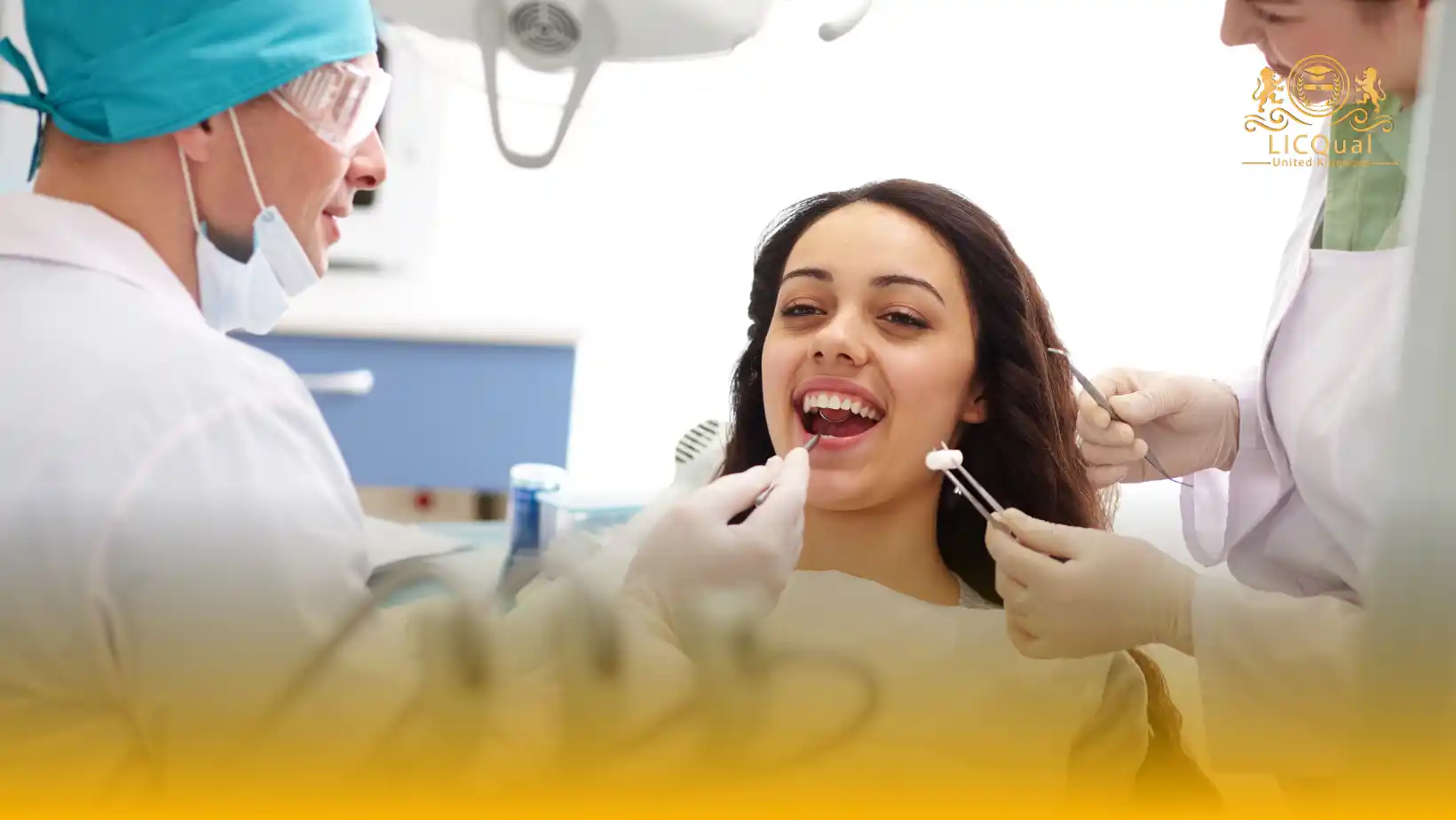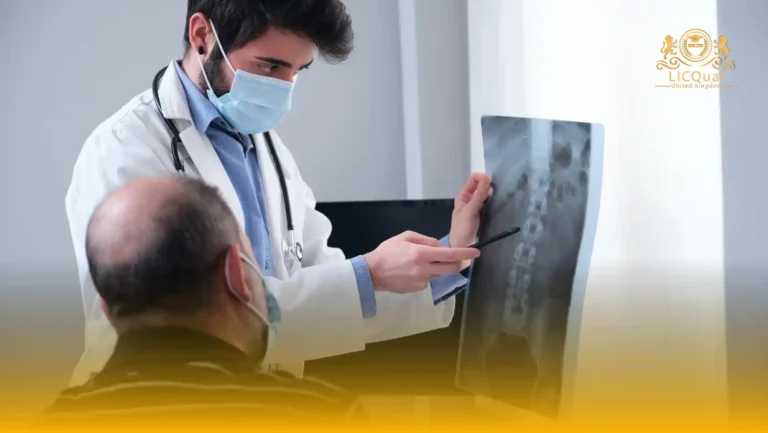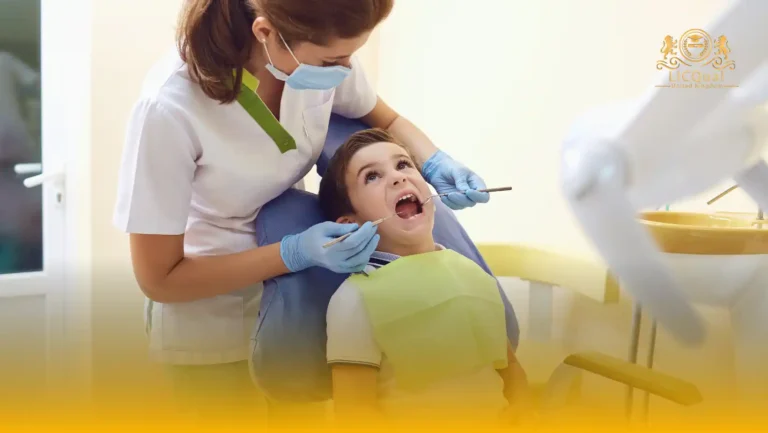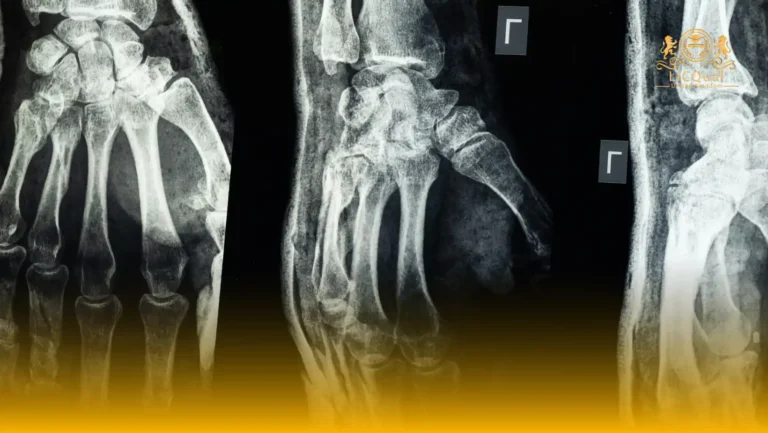The LICQual Level 7 Postgraduate Diploma in Oral Medicine (PgD Oral Medicine) is an advanced professional qualification designed for experienced dental practitioners who wish to specialise further in the diagnosis, management, and treatment of complex oral and maxillofacial conditions. This programme equips learners with in-depth theoretical knowledge and advanced clinical skills, enabling them to deliver high-quality patient care in both primary and specialist settings.
This qualification is not intended for fresh candidates; it is tailored for practising professionals who are committed to enhancing their expertise, expanding their scope of practice, and strengthening their Continuing Professional Development (CPD) portfolio. Learners will explore advanced topics including oral mucosal diseases, salivary gland disorders, orofacial pain syndromes, and the oral manifestations of systemic diseases, while integrating evidence-based clinical decision-making into their practice.
The course blends academic study with practical application, ensuring learners develop the competence and confidence to manage challenging oral medicine cases. With a strong emphasis on interdisciplinary collaboration, diagnostic accuracy, and patient-centred care, this programme prepares professionals for higher-level responsibilities in clinical practice, education, and research.
By completing the PgD in Oral Medicine, learners will not only refine their diagnostic and treatment planning abilities but also enhance their career prospects in specialist dentistry, hospital settings, and academic roles. This qualification supports professional growth, international recognition, and a commitment to excellence in oral healthcare.
Course Overview
Qualification Title
LICQual Level 7 Postgraduate Diploma in Oral Medicine (PgD Oral Medicine)
Total Units
6
Total Credits
120
GLH
600
Qualification #
LICQ2200698
Qualification Specification
To enroll in the LICQual Level 7 Postgraduate Diploma in Oral Medicine (PgD Oral Medicine), applicants must meet the following criteria:
|
Qualification# |
Unit Title |
Credits |
GLH |
|---|---|---|---|
|
LICQ2200698-1 |
Foundations of Oral Medicine |
20 |
100 |
|
LICQ2200698-2 |
Oral Mucosal and Salivary Gland Disorders |
20 |
100 |
|
LICQ2200698-3 |
Orofacial Pain and Temporomandibular Disorders |
20 |
100 |
|
LICQ2200698-4 |
Oral Manifestations of Systemic Disease |
20 |
100 |
|
LICQ2200698-5 |
Diagnostic Techniques and Investigations in Oral Medicine |
20 |
100 |
|
LICQ2200698-6 |
Clinical Practice, Treatment Planning, and Patient Management |
20 |
100 |
By the end of this course, learners will be able to:
1. Foundations of Oral Medicine
By the end of this unit, the learner will be able to:
- Analyse the historical development and scope of oral medicine within dentistry.
- Critically evaluate the aetiology and pathophysiology of common oral diseases.
- Integrate oral medicine principles into general and specialist dental practice.
- Apply evidence-based approaches to diagnosis and treatment planning.
2. Oral Mucosal and Salivary Gland Disorders
By the end of this unit, the learner will be able to:
- Identify and classify oral mucosal lesions and salivary gland disorders.
- Assess clinical presentations and formulate differential diagnoses.
- Implement evidence-based management strategies for mucosal and glandular conditions.
- Collaborate effectively in multidisciplinary teams for patient care.
3. Orofacial Pain and Temporomandibular Disorders
By the end of this unit, the learner will be able to:
- Evaluate the aetiology and pathophysiology of orofacial pain syndromes.
- Assess and diagnose temporomandibular joint disorders using clinical and investigative tools.
- Apply pharmacological and non-pharmacological management techniques.
- Develop patient-centred care plans to manage complex pain cases.
4. Oral Manifestations of Systemic Disease
By the end of this unit, the learner will be able to:
- Analyse how systemic diseases present in the oral cavity.
- Integrate systemic and oral assessments for comprehensive diagnosis.
- Formulate management plans for patients with complex systemic and oral health needs.
- Critically evaluate evidence linking oral and systemic health outcomes.
5. Diagnostic Techniques and Investigations in Oral Medicine
By the end of this unit, the learner will be able to:
- Select and apply advanced diagnostic techniques and investigations.
- Interpret imaging, laboratory, and biopsy results accurately.
- Make informed clinical decisions based on investigative findings.
- Develop evidence-based treatment plans integrating diagnostic results.
6. Clinical Practice, Treatment Planning, and Patient Management
By the end of this unit, the learner will be able to:
- Conduct comprehensive patient assessments in oral medicine.
- Design and implement personalised treatment plans for complex cases.
- Apply risk management and ethical principles in clinical practice.
- Demonstrate effective multidisciplinary collaboration to optimise patient outcomes.
The LICQual Level 7 Postgraduate Diploma in Oral Medicine (PgD Oral Medicine) is designed for dental professionals, oral health practitioners, and clinicians seeking advanced knowledge in diagnosing and managing complex oral conditions. This course is ideal for those who want to gain internationally recognized qualifications and develop specialized expertise in oral medicine, oral pathology, and patient care. Whether you are a practicing dentist, a recent graduate, or a professional aiming to enhance your clinical and academic career, this diploma provides the skills and credibility needed to excel in specialist dental practice.
1. Practicing Dentists Seeking Specialization in Oral Medicine
- Ideal for licensed dentists wanting to expand clinical expertise in oral medicine.
- Provides training in advanced diagnostic assessment and management of oral diseases.
- Enhances skills in treating mucosal disorders, salivary gland conditions, and orofacial pain.
- Strengthens confidence in clinical decision-making and patient management.
- Offers internationally recognized credentials for career advancement.
2. Dental Graduates and Early-Career Professionals
- Suitable for BDS, DDS, or equivalent graduates seeking postgraduate specialization.
- Builds a strong foundation in oral pathology and clinical oral medicine.
- Prepares learners for advanced roles or Master’s-level oral medicine programs.
- Increases employability in dental hospitals, clinics, and academic institutions.
- Encourages evidence-based practice and critical thinking in oral healthcare.
3. Oral Medicine Specialists
- Designed for dentists focusing on advanced diagnostic and therapeutic oral care.
- Provides exposure to complex clinical cases and multidisciplinary treatment planning.
- Enhances expertise in oral pathology, mucosal disease, and salivary gland disorders.
- Strengthens practical skills in managing chronic and systemic oral conditions.
- Supports professional growth as a recognized oral medicine expert.
4. International Dental Professionals
- Tailored for practitioners seeking UK-accredited postgraduate oral medicine qualifications.
- Offers flexible online learning options for global accessibility.
- Aligns with international standards for diagnosis and management of oral diseases.
- Provides recognition to support global career mobility and professional credibility.
- Enhances opportunities for teaching, consultancy, and clinical leadership abroad.
5. Dental Educators and Academic Professionals
- Ideal for dental lecturers and clinical trainers updating curriculum knowledge.
- Incorporates the latest evidence-based oral medicine techniques into teaching.
- Supports academic leadership and research in oral healthcare.
- Enhances credibility as an expert in specialist oral medicine education.
- Provides opportunities to contribute to academic publications and case studies.
6. Clinical Supervisors and Healthcare Managers in Dentistry
- Suitable for professionals overseeing oral medicine departments or clinics.
- Provides insight into quality assurance and patient safety in oral care.
- Enhances ability to manage clinical teams and implement best practices.
- Strengthens understanding of diagnostic protocols and treatment guidelines.
- Supports professional growth in leadership and operational roles.
7. Career-Oriented Dental Professionals Seeking Global Recognition
- Ideal for those aiming for internationally recognized oral medicine qualifications.
- Enhances professional credibility and expertise in specialist dental care.
- Opens pathways to academic, clinical, and consultancy roles globally.
- Provides a career-boosting foundation for advanced oral medicine studies.
- Equips professionals with skills to excel in multidisciplinary and high-level clinical environments.
Centres delivering the LICQual Level 7 Postgraduate Diploma in Oral Medicine (PgD Oral Medicine) must meet the following requirements to ensure high-quality training, assessment, and learner support:
- Accreditation and Approval
- Must be an officially approved LICQual centre with valid accreditation to deliver Level 7 postgraduate dental qualifications.
- Centres should comply with LICQual’s quality assurance and assessment standards.
- Qualified and Experienced Staff
- Trainers and assessors must hold recognised qualifications in dentistry and oral medicine.
- Faculty should have substantial clinical experience in oral medicine and related dental specialties.
- Assessors must be trained in postgraduate assessment practices and internal verification.
- Facilities and Clinical Resources
- Access to fully equipped dental clinical facilities, including consultation rooms, diagnostic tools, and treatment equipment.
- Availability of imaging and laboratory resources for diagnostic investigation and case management.
- Compliance with health, safety, and infection control regulations.
- Learning Resources
- Provision of up-to-date academic materials, reference texts, case studies, and access to professional journals.
- Digital platforms for online learning, interactive sessions, and learner support.
- Assessment and Quality Assurance
- Systems for conducting practical, written, and oral assessments in line with Level 7 standards.
- Secure record-keeping of learner progress, assessment evidence, and verification activities.
- Learner Support
- Academic and pastoral support for learners throughout the programme.
- Clear guidance on course requirements, learning outcomes, and CPD opportunities.
Assessment and Verification
All units within this qualification are subject to internal assessment by the approved centre and external verification by LICQual. The qualification follows a criterion-referenced assessment approach, ensuring that learners meet all specified learning outcomes.
To achieve a ‘Pass’ in any unit, learners must provide valid, sufficient, and authentic evidence demonstrating their attainment of all learning outcomes and compliance with the prescribed assessment criteria. The Assessor is responsible for evaluating the evidence and determining whether the learner has successfully met the required standards.
Assessors must maintain a clear and comprehensive audit trail, documenting the basis for their assessment decisions to ensure transparency, consistency, and compliance with quality assurance requirements.







